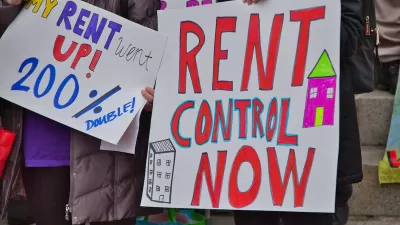The state of Minnesota requires local rent control law to be approved by general election, so the city of Minneapolis is forced to take several preemptory steps to get a rent stabilization ordinance on the ballot.

Solomon Gustavo reports on the growing political support for rent control in Minneapolis, where voters could be offered the chance this November to vote on two questions related to rent control.
The questions would take the first steps toward rent control by asking voters to consider two proposed charter amendments. According to Gustavo, "the questions themselves would not impose any changes to how rental property is regulated in the city. Rather, they seek the ability for the city to do so — by getting around a Minnesota law that currently prevents cities from implementing rent control."
The first of the two proposed charter amendments would grant voters the power to propose, by initiative, a rent stabilization ordinance (i.e., a rent control ordinance). The second proposed amendment would grant the City Council the power to draft a rent stabilization ordinance for voters to subsequently consider.
These initial steps are necessary to work around the state of Minnesota's rent control law, which, writes Gustavo, "says that charter cities in the state can engage in 'controlling rent on private residential property' only if 'the ordinance, charter amendment, or law that controls rents is approved in a general election.'"
FULL STORY: The push for rent control in Minneapolis, explained

Planetizen Federal Action Tracker
A weekly monitor of how Trump’s orders and actions are impacting planners and planning in America.

Maui's Vacation Rental Debate Turns Ugly
Verbal attacks, misinformation campaigns and fistfights plague a high-stakes debate to convert thousands of vacation rentals into long-term housing.

San Francisco Suspends Traffic Calming Amidst Record Deaths
Citing “a challenging fiscal landscape,” the city will cease the program on the heels of 42 traffic deaths, including 24 pedestrians.

Amtrak Rolls Out New Orleans to Alabama “Mardi Gras” Train
The new service will operate morning and evening departures between Mobile and New Orleans.

The Subversive Car-Free Guide to Trump's Great American Road Trip
Car-free ways to access Chicagoland’s best tourist attractions.

San Antonio and Austin are Fusing Into one Massive Megaregion
The region spanning the two central Texas cities is growing fast, posing challenges for local infrastructure and water supplies.
Urban Design for Planners 1: Software Tools
This six-course series explores essential urban design concepts using open source software and equips planners with the tools they need to participate fully in the urban design process.
Planning for Universal Design
Learn the tools for implementing Universal Design in planning regulations.
Heyer Gruel & Associates PA
JM Goldson LLC
Custer County Colorado
City of Camden Redevelopment Agency
City of Astoria
Transportation Research & Education Center (TREC) at Portland State University
Jefferson Parish Government
Camden Redevelopment Agency
City of Claremont





























